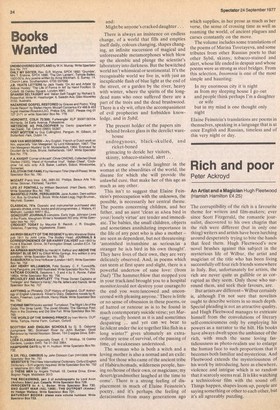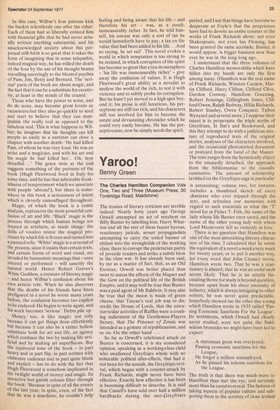Rich and poor
Peter Ackroyd
An Artist and a Magician Hugh Fleetwood (Hamish Hamilton 24.25)
The corruptibility of the rich is a favourite theme for writers and film-makers; ever since Scott Fitzgerald, the romantic journalist, discovered to his own chagrin that the rich were different (but in only one thing) writers and artists have been lurching around desperately trying to bite the hands that feed them. Hugh Fleetwood's new 'novel brushes against' this subject in the mysterious life of Wilbur, the artist and magician of the title who has been living successfully off four rich friends somewhere in Italy. But, unfortunately for artists, the rich are never quite as gullible or as corrupted as they seem. Only those who surround them, and seek their favours, are.
But artists are different — Wilbur certainly is, although I'm not sure that novelists ought to describe writers in so much depth. Special pleading is not an attractive quality, and Hugh Fleetwood manages to extricate himself from the convolutions of literary self-consciousness only by employing his powers as a narrator to the hilt. His books have always dwelt upon the ambiance of the rich, with much the same loving fastidiousness as photo-realists use to enlarge the human face to such proportions that it becomes both familiar and mysterious. And Fleetwood extends the mysteriousness of his work by introducing, here as elsewhere, violence and intrigue which is so random that it scarcely seems real. It is like watching a technicolour film with the sound off. Things happen, shapes loom up, people are saying something or other to each other, but it's all agreeably puzzling. In this case, Wilbur's four patrons kick the bucket relentlessly one after the other. Each of them had so liberally enticed him with financial gifts that he had never actually written anything substantial, and his unacknowledged anxiety about this perpetual still-birth is so great that it takes the form of imagining that in some telepathic, indeed magical way, he has willed the death of the four by the use of his thought beams travelling unerringly to the bloated psyches of Pam, Jim, Betty and Bernard. The 'serious' parts of the book are about magic, and the fact that it can be a substitute for creativity, at least in the minds of the crazed.
Those who have the power to write, and do do none, may become great lovers or raconteurs. but they also go quickly to seed and start to believe that they can manipulate the really real as opposed to the fabulous real. This is what happens to Wilbur; he imagines that his thoughts can kill people as easily as a narrator can close a chapter with another death: 'He had killed Pam, of whom he was very fond. He was an artist and a magician, and with his art and his magic he had killed her.. .0h, how dreadful. . .' The grace note at the end suggests something of the pertness of the book (Hugh Fleetwood lived in Italy for some time, and he has that admirable freakishness of temperament which we associate With people 'abroad), but there is somewhere in this book a seriousness of intent Which is cleverly camouflaged throughout.
Magic, of which the book is a comic analysis, represents the most powerful confusion of art and life. 'Black' magic is the process through which human beings are treated as artefacts, as made things: the dolls of voodoo mimic the magical processes by which life is frozen and turned into a painted relic. 'White' magic is a reversal of the process, since it insists that certain texts, and certain forms of word and ritual, are invaded by humanistic meanings that —once uttered or performed — will sanctify the natural world. Hence Robert Graves's White Goddess, a creature of literary magic — and hence Wilbur's confusion about his ovvn artistic role. When he also discovers that the deaths of his friends have been Prefigured in a novel he wrote many years before, the confusion becomes too explicit to be endured. He begins to write again, and his work becomes 'serious'. Debts pile up.
Money, too, is like magic: not only because it can get things done effortlessly but because it can also be a rather hollow substitute both for art and life, an agency Which confuses the two by making life artificial and by making art superfluous. But the equivocal tone of the book — in part heavy and in part flip, in part written with elaborate cadences and in part quite blank and explicit — has to do with the fact that Hugh Fleetwood is somehow implicated in the twilight world of money and magic. Its attractive but garish colours filter through the book: 'Because in spite of all the events of the last year, in spite, even, of the fact that he was a murderer, he couldn't help feeling and being aware that his life — and therefore his art — was, as a result, immeasurably richer. In fact, he told himself, his unease was only a sort of tax he would henceforth have to pay; a tax on the value that had been added to his life. . .And so saying, he set sail'. This novel evokes a world in which temptation is too .strong to be resisted, in which corruption of the spirit has become so great that even its metaphors — 'his life was immeasurably richer' — give away the confusion of values. It is Hugh Fleetwood's great ability as a novelist to analyse the world of the rich, to test it with violence and to subtly probe its corruption. But he hasn't yet moved to a high spot beyond it; his prose is still luxurious, his perceptions are still too rich, and his characters still too involved for him to become the astute and devastating chronicler which he could very easily become. He has the perceptiveness; now he simply needs the spirit.



































 Previous page
Previous page